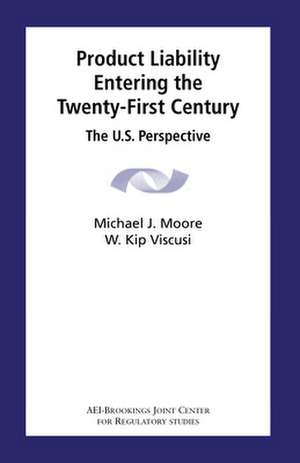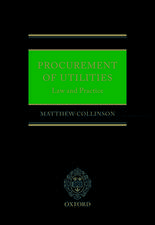Product Liability Entering the Twenty-First Century: The U.S. Perspective
Autor Michael J. Moore, W. Kip Viscusien Limba Engleză Paperback – oct 2001
Are liability "crises" an inevitable part of the modern industrial landscape? Does the inherent nature of the insurance industry promote recurring liability crises? What have been the effects of the liability reforms of the 1990s? Should lawyers be given de facto regulatory authority? This report provides perspective on these and other key issues concerning the law and economics of products liability. The authors begins with a brief description of the evolution of products liability doctrine in the U.S., up to the point of the liability crisis of the late 1980s. They discuss the economic implications of product risk for both consumers and producers, offer economic hypothesis on the implications of the increased scope of liability and subsequent reforms, and provide an update of trends in litigation and liability law. The book ends with a discussion of pending legislation and prospects for further improvements. Moore and Viscusi make the point that effective liability policy calls for a balancing of the incentives for improved public safety on one hand, and the benefits of new and existing products on the other.
Preț: 99.02 lei
Nou
Puncte Express: 149
Preț estimativ în valută:
18.95€ • 19.92$ • 15.66£
18.95€ • 19.92$ • 15.66£
Carte tipărită la comandă
Livrare economică 16-30 aprilie
Preluare comenzi: 021 569.72.76
Specificații
ISBN-13: 9780815702290
ISBN-10: 0815702299
Pagini: 64
Dimensiuni: 152 x 229 x 4 mm
Greutate: 0.07 kg
Editura: Brookings Institution Press
Colecția Brookings Institution Press and AEI
ISBN-10: 0815702299
Pagini: 64
Dimensiuni: 152 x 229 x 4 mm
Greutate: 0.07 kg
Editura: Brookings Institution Press
Colecția Brookings Institution Press and AEI
Notă biografică
Michael J. Moore is a visiting associate professor at the Darden School of Business Administration, University of Virginia and a research associate at the National Bureau of Economic Research. W. Kip Viscusi is John F. Cogan Jr. Professor of Law and Economics and director of the Program on Empirical Legal Studies at Harvard Law School.
Descriere
A Brookings Institution Press and American Enterprise Institute publication
Are liability "crises" an inevitable part of the modern industrial landscape? Does the inherent nature of the insurance industry promote recurring liability crises? What have been the effects of the liability reforms of the 1990s? Should lawyers be given de facto regulatory authority?
This report provides perspective on these and other key issues concerning the law and economics of products liability. The authors begins with a brief description of the evolution of products liability doctrine in the U.S., up to the point of the liability crisis of the late 1980s. They discuss the economic implications of product risk for both consumers and producers, offer economic hypothesis on the implications of the increased scope of liability and subsequent reforms, and provide an update of trends in litigation and liability law. The book ends with a discussion of pending legislation and prospects for further improvements.
Moore and Viscusi make the point that effective liability policy calls for a balancing of the incentives for improved public safety on one hand, and the benefits of new and existing products on the other.
Are liability "crises" an inevitable part of the modern industrial landscape? Does the inherent nature of the insurance industry promote recurring liability crises? What have been the effects of the liability reforms of the 1990s? Should lawyers be given de facto regulatory authority?
This report provides perspective on these and other key issues concerning the law and economics of products liability. The authors begins with a brief description of the evolution of products liability doctrine in the U.S., up to the point of the liability crisis of the late 1980s. They discuss the economic implications of product risk for both consumers and producers, offer economic hypothesis on the implications of the increased scope of liability and subsequent reforms, and provide an update of trends in litigation and liability law. The book ends with a discussion of pending legislation and prospects for further improvements.
Moore and Viscusi make the point that effective liability policy calls for a balancing of the incentives for improved public safety on one hand, and the benefits of new and existing products on the other.











